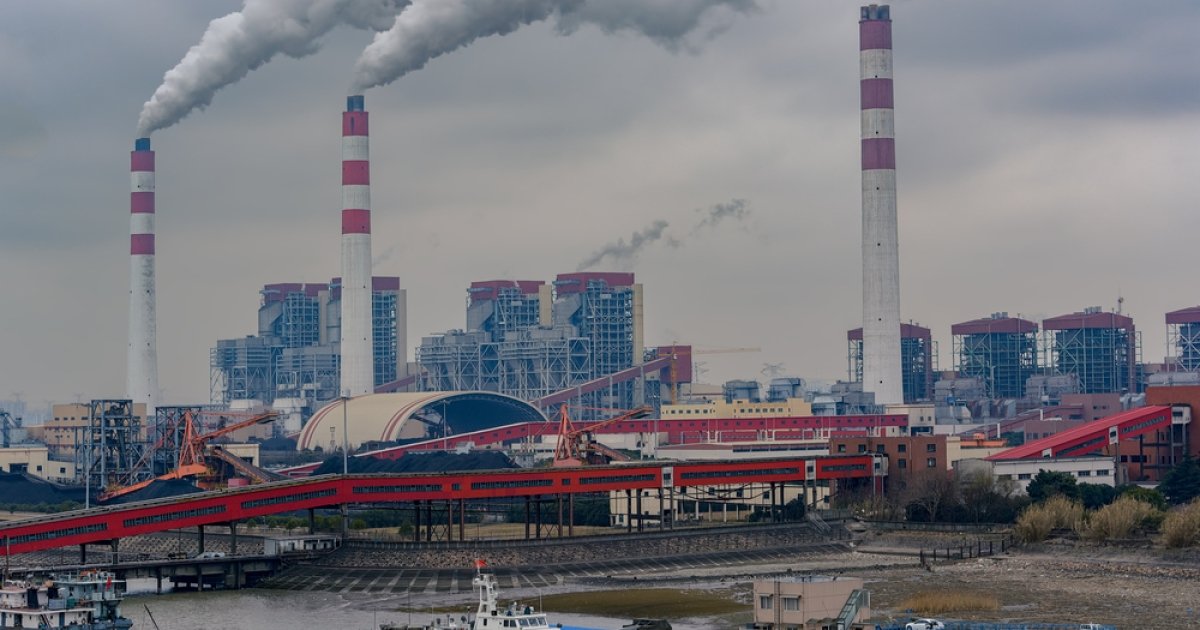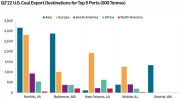-
Please take a moment and update your account profile. If you have an updated account profile with basic information on why you are on Air Warriors it will help other people respond to your posts. How do you update your profile you ask?
Go here:
Edit Account Details and Profile
You are using an out of date browser. It may not display this or other websites correctly.
You should upgrade or use an alternative browser.
You should upgrade or use an alternative browser.
Energy Discussion
- Thread starter Treetop Flyer
- Start date
So indirect greenhouse gases are not an equal threat to the climate as direct greenhouse gases. Just how does the climate know which is which.No greenhouse gases, at least directly.

I’m sure a few are created making a wind turbine or solar array. Just heading off the back row sniping sea lawyer that everyone hates in an argument. ?So indirect greenhouse gases are not an equal threat to the climate as direct greenhouse gases. Just how does the climate know which is which.
HW brings up an interesting question. California has roughly 600,000 electric cars out of 30,000,000 vehicles - and are asking people not to charge cars to help the grid. As California wants to rid itself of fossil fuel plants and decommission nuclear plants while vastly increasing electric cars, heat pumps and ranges - where is the 24/7 power going to come from? If you have any data, I would be interested in seeing the numbers.
Solar panels can help out, and California has mandated new homes and buildings incorporate them. As for their feasibility, a coworker had solar panels installed along with a Powerwall and got a Model 3 Tesla as well. They get very little electricity from the grid and have had no issues in the two years they have had everything done.
A disadvantage of renewables is that they require very substantial amounts of rare earth metals from countries such as the DRC and Russia which are then processed in and purchased from China - seems to be a vulnerable supply chain in contrast to domestic natural gas and coal.
Domestic natural gas production and distribution is plenty vulnerable enough, and that is if producers choose to keep 'producing' it. It also happens to be a finite resource. As for coal, that is rapidly going the way of the dodo domestically and in most of the first world for a variety of good reasons.
A second disadvantage is that these sources of power are both intermittent and seldom co-located near their end user.
As is very often the case with oil and gas.
A third disadvantage is that since these sources are intermittent, you still have the expense of building a gas power plant for backup to provide 24/7 power.
Backup power doesn't have to be gas, storage can help and many plants already exist.
A fourth difference is that a traditional power plant will require much less land than either solar or wind.
You don't need a traditional power plant for solar panels or wind turbines and can put them where power plants can't go, like on top of a house or in the water.
And as mentioned in the beginning, the upfront capital cost of a conventional plant appear to be substantially less. As interest rates climb, the upfront outlay that is financed becomes more expensive.
Solar and wind are newer energy generation technologies that are rapidly maturing and evolving, I would be surprised if the upfront costs remain as high as they are now in the next 20 to 30 years. It would also be interesting to see the time frame used for many of those 'studies' or comparisons. And interest rates are going to affect everyone.
Not so much in China (or India for that matter) .As for coal, that is rapidly going the way of the dodo domestically and in most of the first world for a variety of good reasons.

Chinese Coal-based Power Plants
Xi's dubious 2020 pledge aside, I think this excerpt from the article illustrates that coal probably isn't going anywhere anytime soon at least from a global perspective.
"When Xi Jinping surprised the world with his 2020 pledge for carbon neutrality by 2060, China’s economy was stronger than it is today and the top-down crackdowns on existing coal plants were real. Fast forward to today and the drive to restart its economy after COVID-19 lockdowns has pushed Chinese policymakers to prioritize energy security and economic growth over carbon reductions. The foundation for China’s clean energy transition still exists, but these new coal plants mark a sobering lock-in of high-carbon energy."
ABMD
Bullets don't fly without Supply
Often times the back-up or standby power sources are diesel generators.Backup power doesn't have to be gas, storage can help and many plants already exist.
Last edited:
ABMD
Bullets don't fly without Supply
Q2 US Coal exports increased by almost 15% bound for Europe and Asia.Not so much in China (or India for that matter) .

Economies like India are also struggling to take the leap into renewables when coal is both abundant and affordable and India is getting that coal from Russia. And you are also starting to see smaller countries either adopt or protecting coal, Vietnam is forecasting to increase coal imports over the next 12-15 years additionally Kazakhstan is drafting orders to protect their domestic coal supply in the short-term, by banning certain exports from the country.
At the same time, China has undergone an insane off-the-charts heat wave for the last few months. The odds have that having nothing to do with warming and greenhouse gases are pretty slim.Xi's dubious 2020 pledge aside, I think this excerpt from the article illustrates that coal probably isn't going anywhere anytime soon at least from a global perspective.
Big energy crunch due to the heat. They need to burn coal to run the air conditioners.

The world has never seen a heat wave quite like China's 70-day streak
The event has affected well over 100 million people, and further disrupted global supply chains.
Ah, does it work? Is it feasible? Sure. But does it make economic sense? If it absolutely did, with or without subsidies, you would see that type of extensive conversion up and down the street. As it is, getting your investment back is so far down the road it doesn't make sense for most people. I am certain it is less expensive now, but I had a buddy in CA do the same thing (with storage) about 8 years ago, and he said he would NEVER see a return on the investment. But he didn't do it for economic reasons.As for their feasibility, a coworker had solar panels installed along with a Powerwall and got a Model 3 Tesla as well. They get very little electricity from the grid and have had no issues in the two years they have had everything done.
What is net worse for the environment? Replacing systems on a more-or-less attrition basis with more efficient and modern ones? Or having a lot of systems make a switch and creating a huge demand for new materials and manufacturing, all at once?
I'm in the "gain efficiency as things wear out" camp, myself. But I also think we should be building for longer-lasting things; I hate planned obsolescence. Making and replacing more stuff faster is good for business, but can be bad for the environment. The longevity of EVs is something I find particularly interesting- your Tesla wearing out may not be your problem 5 years from now if you change vehicles every 3 years, but it'll be someone's problem...
I'm in the "gain efficiency as things wear out" camp, myself. But I also think we should be building for longer-lasting things; I hate planned obsolescence. Making and replacing more stuff faster is good for business, but can be bad for the environment. The longevity of EVs is something I find particularly interesting- your Tesla wearing out may not be your problem 5 years from now if you change vehicles every 3 years, but it'll be someone's problem...
ABMD
Bullets don't fly without Supply
How much did he pay for those solar panels? And what is the breakeven for the savings vs. capital cost to install those panels?Solar panels can help out, and California has mandated new homes and buildings incorporate them. As for their feasibility, a coworker had solar panels installed along with a Powerwall and got a Model 3 Tesla as well. They get very little electricity from the grid and have had no issues in the two years they have had everything done.
Domestic natural gas production and distribution is plenty vulnerable enough, and that is if producers choose to keep 'producing' it. It also happens to be a finite resource. As for coal, that is rapidly going the way of the dodo domestically and in most of the first world for a variety of good reasons.
Trust me, as someone in that industry, producers WANT to keep producing, especially when domestic prices are multiples of their cost to get the molecules out of the ground, not to mention if they could sell those same molecules on the global LNG market. The issue isn't the producers producing, the issue is policy coming from DC and how rhetoric or actual policy effects a companies short and long-term capital investments in things like infrastructure as well as how that rhetoric/policy changes the behavior of the bank that lend them capital for those investments.
This is a narrow and unfounded view of climate science. Global sea levels rose over 200 feet and global temps rose incrementally from before the ice age (13,000 years ago) until the time of ancient Rome.The odds have that having nothing to do with warming and greenhouse gases are pretty slim.

Just so we’re clear, are you arguing that anthropogenic climate change isn’t occurring?This is a narrow and unfounded view of climate science. Global sea levels rose over 200 feet and global temps rose incrementally from before the ice age (13,000 years ago) until the time of ancient Rome.

Trust me, as someone in that industry, producers WANT to keep producing, especially when domestic prices are multiples of their cost to get the molecules out of the ground, not to mention if they could sell those same molecules on the global LNG market. The issue isn't the producers producing, the issue is policy coming from DC and how rhetoric or actual policy effects a companies short and long-term capital investments in things like infrastructure as well as how that rhetoric/policy changes the behavior of the bank that lend them capital for those investments.
Frackers Hold Back Production as Oil Nears $100 a Barrel
Prices are the highest since 2014, but top shale companies like Devon and Pioneer are choosing to grow slowly rather than drill more.
The oil companies have been burned in the past by the boom-bust cycle. They're probably not eager to expand with abandon and have it happen again, especially with all the anti-oil sentiment that circulates in popular media.
